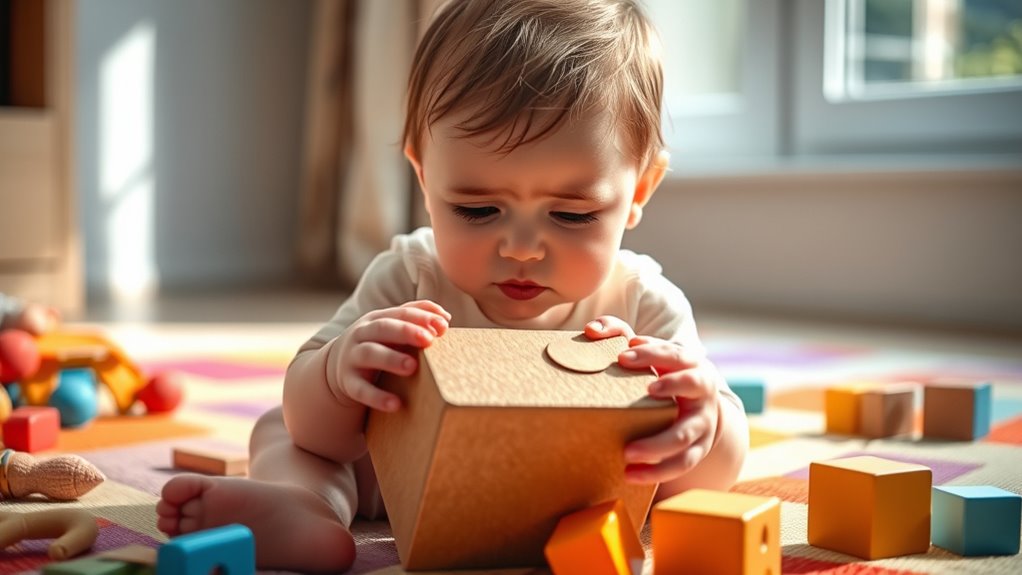Allowing your baby to face small challenges and struggle a bit encourages their problem-solving skills and resilience. When you step back and let them experiment, they learn to think creatively, persevere, and see setbacks as normal. Patience and gentle encouragement help them build confidence and develop important motor and cognitive skills. Embracing these moments of struggle makes learning fresh and fun. Keep going, and you’ll discover more ways to support their growth through playful challenges.
Key Takeaways
- Allow babies to experiment and solve small challenges independently to foster curiosity and critical thinking skills.
- Gentle setbacks encourage resilience, teaching babies that persistence leads to success.
- Stepping back and avoiding immediate help promotes creative problem-solving and confidence.
- Celebrating efforts and progress motivates babies to tackle new challenges with patience.
- Consistent practice of facing manageable struggles builds long-term perseverance and motor skills.

Effective problem solving is an essential skill that can open new opportunities and improve your decision-making. When it comes to helping babies develop this skill, one surprisingly effective approach involves introducing playful challenges that encourage them to think and explore. These challenges aren’t about making things difficult for the sake of frustration but about offering just enough difficulty to engage their curiosity and motivate them to persist. By carefully designing these playful challenges, you help your baby learn that setbacks are normal and that perseverance can lead to success. This is where persistence strategies come into play, teaching your little one to keep trying even when faced with obstacles.
You might wonder how to incorporate playful challenges into your baby’s daily routine. Think about simple tasks that require problem solving, like encouraging them to reach for a toy that’s just out of reach or guiding them to fit a shape into the correct hole. Instead of immediately helping, you can step back and let them experiment. This tiny bit of struggle is vital because it pushes them to think creatively and develop their motor skills. Plus, it turns problem solving into an engaging game rather than a chore. When they do succeed, celebrate their effort and achievement. This positive reinforcement boosts their confidence and motivates them to take on new challenges.
Persistence strategies are key here. You want to create an environment where your baby understands that trying again after a failure is normal and valuable. If they get stuck, instead of rushing in to fix the problem, give them time and gentle encouragement to figure it out themselves. For instance, if they can’t open a container, instead of immediately doing it for them, suggest they try again or offer hints. This teaches resilience—the idea that setbacks are just part of learning. Over time, they’ll start to see challenges not as insurmountable but as puzzles they can solve with effort and patience. Additionally, understanding that cell turnover plays a role in skin health can help you appreciate the importance of gradual, consistent efforts—whether in skincare or in helping your child develop problem-solving skills.
Frequently Asked Questions
How Can Parents Balance Allowing Struggle and Avoiding Frustration?
You should focus on balancing your baby’s emotional readiness and your parental patience. When they face challenges, give gentle encouragement without rushing to fix things. Watch for signs of frustration, and if they get overwhelmed, step in to provide comfort. This way, you foster resilience, allowing them to struggle just enough to learn, while ensuring they feel safe and supported. Patience helps them develop confidence and problem-solving skills gradually.
What Are Signs a Baby Is Ready for More Challenging Problems?
Imagine a scene from a vintage movie—your baby’s curiosity sparks like a flickering lamp. When they show clear mood indicators like increased focus or persistent engagement cues, it’s a sign they’re ready for more challenging problems. Watch for signs like trying new approaches, staying engaged longer, or solving puzzles with less frustration. These cues tell you they’re enthusiastic to stretch their skills and learn through a little more challenge.
How Does Struggle Specifically Enhance Neural Development?
When you let your baby struggle a little, you’re tapping into neural plasticity, which allows their brain to adapt and grow. Struggle encourages synaptic strengthening, where connections between neurons become more efficient. This process helps your baby develop critical problem-solving skills and resilience. By providing challenges, you’re actively supporting their neural development, making their brain more flexible and capable of learning new skills more effectively over time.
Are There Age-Appropriate Ways to Introduce Manageable Challenges?
You can introduce age-appropriate challenges by offering activities that match your baby’s developmental milestones, encouraging curiosity, and fostering independence. Provide simple puzzles, safe objects to explore, and opportunities to try new skills. These challenges should be manageable, not overwhelming, so your baby feels motivated rather than frustrated. By doing this, you support their growth, build confidence, and help them develop essential problem-solving skills naturally and effectively.
Can Over-Struggling Harm a Baby’s Confidence or Development?
You ask if over-struggling can harm a baby’s confidence or development. While some struggle promotes resilience, too much can lead to frustration and overconfidence risks, making them feel overwhelmed. To support healthy growth, you should help them manage frustration, encouraging persistence without pushing too hard. This balance guarantees they build confidence and problem-solving skills without feeling discouraged or overwhelmed, fostering steady emotional and cognitive development.
Conclusion
By allowing your baby a little struggle, you’re giving them a glimpse of a mountain they can climb, not an insurmountable wall. It’s like watching a tiny seed push through the soil, slowly but surely, growing stronger with each effort. Instead of shielding them from every challenge, you’re nurturing resilience and curiosity. Remember, just as a puzzle piece finds its fit, your baby’s problem-solving skills will flourish when they’re given space to try, fail, and try again.









